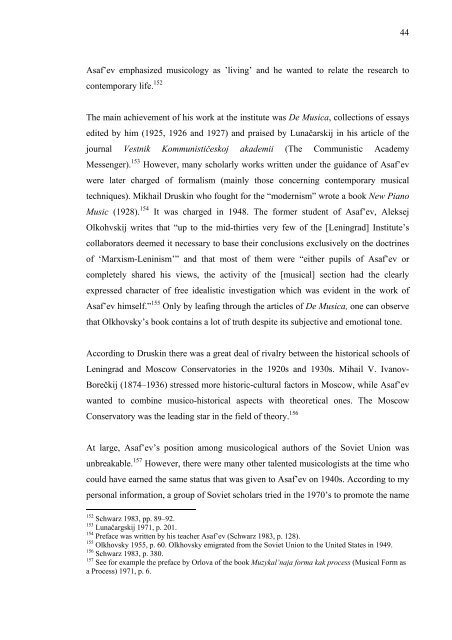Boris Asaf'ev and the Soviet Musicology - E-thesis
Boris Asaf'ev and the Soviet Musicology - E-thesis
Boris Asaf'ev and the Soviet Musicology - E-thesis
You also want an ePaper? Increase the reach of your titles
YUMPU automatically turns print PDFs into web optimized ePapers that Google loves.
Asaf’ev emphasized musicology as ’living’ <strong>and</strong> he wanted to relate <strong>the</strong> research to<br />
contemporary life. 152<br />
The main achievement of his work at <strong>the</strong> institute was De Musica, collections of essays<br />
edited by him (1925, 1926 <strong>and</strong> 1927) <strong>and</strong> praised by Lunačarskij in his article of <strong>the</strong><br />
journal Vestnik Kommunističeskoj akademii (The Communistic Academy<br />
Messenger). 153 However, many scholarly works written under <strong>the</strong> guidance of Asaf’ev<br />
were later charged of formalism (mainly those concerning contemporary musical<br />
techniques). Mikhail Druskin who fought for <strong>the</strong> “modernism” wrote a book New Piano<br />
Music (1928). 154 It was charged in 1948. The former student of Asaf’ev, Aleksej<br />
Olkohvskij writes that “up to <strong>the</strong> mid-thirties very few of <strong>the</strong> [Leningrad] Institute’s<br />
collaborators deemed it necessary to base <strong>the</strong>ir conclusions exclusively on <strong>the</strong> doctrines<br />
of ‘Marxism-Leninism’” <strong>and</strong> that most of <strong>the</strong>m were “ei<strong>the</strong>r pupils of Asaf’ev or<br />
completely shared his views, <strong>the</strong> activity of <strong>the</strong> [musical] section had <strong>the</strong> clearly<br />
expressed character of free idealistic investigation which was evident in <strong>the</strong> work of<br />
Asaf’ev himself.” 155 Only by leafing through <strong>the</strong> articles of De Musica, one can observe<br />
that Olkhovsky’s book contains a lot of truth despite its subjective <strong>and</strong> emotional tone.<br />
According to Druskin <strong>the</strong>re was a great deal of rivalry between <strong>the</strong> historical schools of<br />
Leningrad <strong>and</strong> Moscow Conservatories in <strong>the</strong> 1920s <strong>and</strong> 1930s. Mihail V. Ivanov-<br />
Borečkij (1874–1936) stressed more historic-cultural factors in Moscow, while Asaf’ev<br />
wanted to combine musico-historical aspects with <strong>the</strong>oretical ones. The Moscow<br />
Conservatory was <strong>the</strong> leading star in <strong>the</strong> field of <strong>the</strong>ory. 156<br />
At large, Asaf’ev’s position among musicological authors of <strong>the</strong> <strong>Soviet</strong> Union was<br />
unbreakable. 157 However, <strong>the</strong>re were many o<strong>the</strong>r talented musicologists at <strong>the</strong> time who<br />
could have earned <strong>the</strong> same status that was given to Asaf’ev on 1940s. According to my<br />
personal information, a group of <strong>Soviet</strong> scholars tried in <strong>the</strong> 1970’s to promote <strong>the</strong> name<br />
152<br />
Schwarz 1983, pp. 89–92.<br />
153<br />
Lunačargskij 1971, p. 201.<br />
154<br />
Preface was written by his teacher Asaf’ev (Schwarz 1983, p. 128).<br />
155<br />
Olkhovsky 1955, p. 60. Olkhovsky emigrated from <strong>the</strong> <strong>Soviet</strong> Union to <strong>the</strong> United States in 1949.<br />
156<br />
Schwarz 1983, p. 380.<br />
157<br />
See for example <strong>the</strong> preface by Orlova of <strong>the</strong> book Muzykal’naja forma kak process (Musical Form as<br />
a Process) 1971, p. 6.<br />
44

















